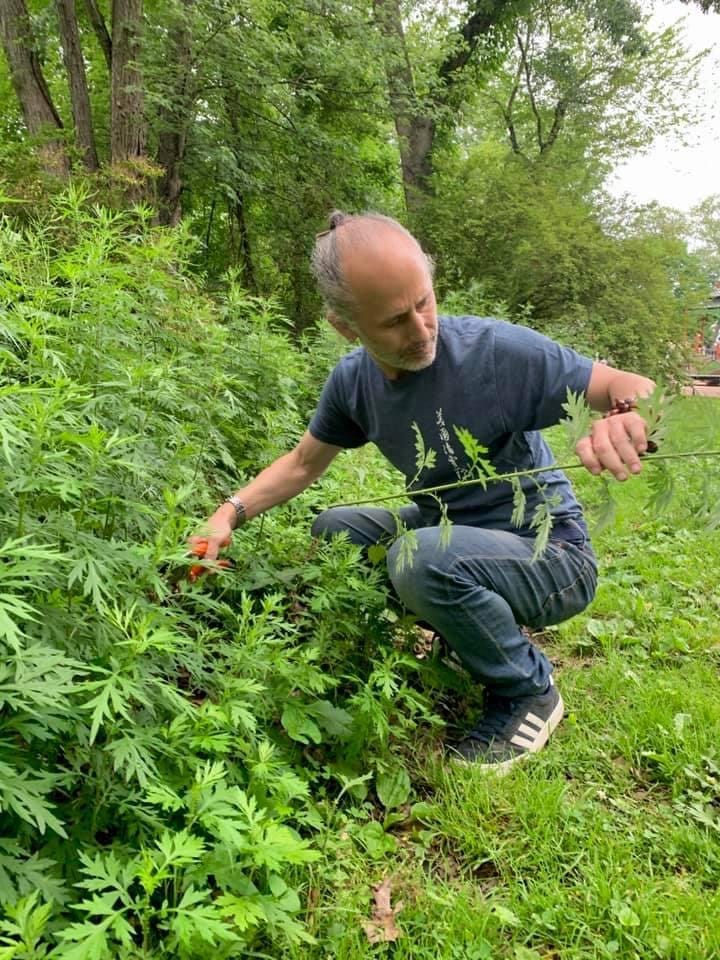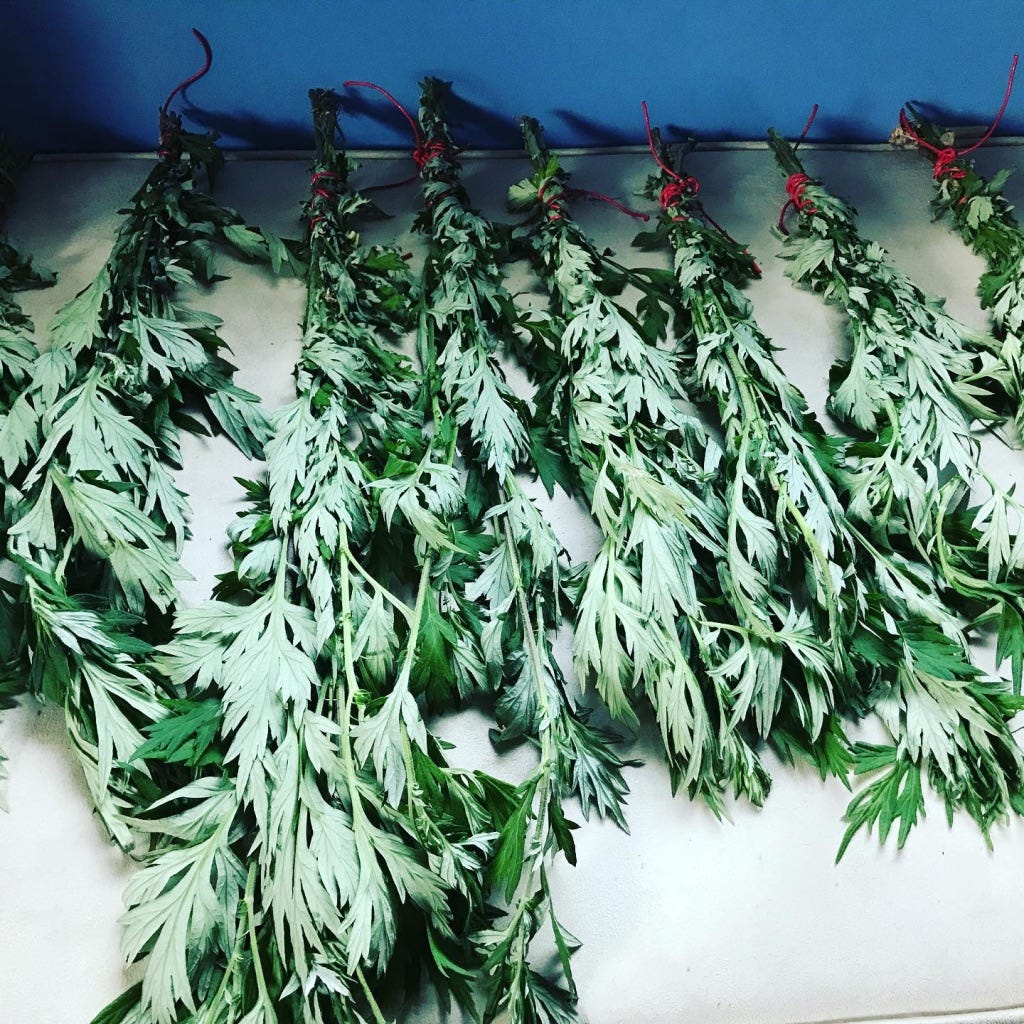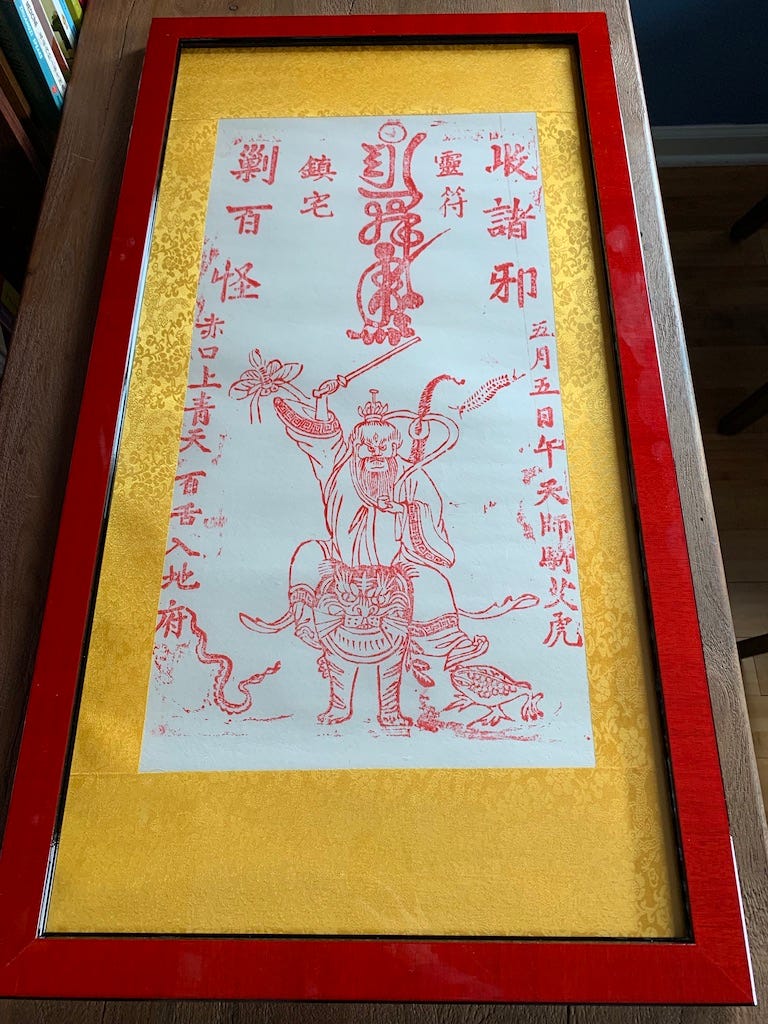Duānwǔ (端午), also known as the Dragon Boat Festival, falls annually on the 5th lunar day of the 5th lunar month, and is an important day in the Daoist and Chinese medicine calendars. It marks the peak of yang-qi, and is said to coincide with the height of activity of poisonous insects and critters. A most toxic time of the year, Daoists take precautions, which include the making of protective talismans, the ritual harvesting and blessings of mugwort/artemesia vulgaris (aiye 艾叶), as well as sweet flag/calamus (changpu 菖蒲), and the hanging of them at house and business entrances. Due to their aromatic and apotropaic (warding off of harm/evil) attributes, they are said to protect against venomous creatures, such snakes, centipedes, scorpions, and other infectious insects, etc. The mugwort is harvested at the height of yang-qi on that day (11am-1pm) as it is imbued with its highest potency at that time. It is then bundled, tied up with red string and hung upside down at the front door entrance of one’s house and/or business as protection while reciting a particular incantation to empower it. Water from natural flowing springs are also collected as spirit water (shen shui/神水), then blessed with talismans and other practices, and saved for later use in many healing rituals. See below for some pictures...
Mugwort: Aiye (艾叶): tends to grow in damp places; treats turbidity, dysbiosis, pathogens, viruses and bacteria, wards off insects (and ghosts). In Chinese medicine, mugwort is harvested this day as it is the herbs highest potency of yang-qi at noon (11am-1pm). It’s flavor is bitter, acrid, and warm and it homes to the Liver, Spleen and Kidneys. It’s functions are to: warm the womb and stop bleeding (eg, prolonged menstrual bleeding; uterine bleeding from deficiency cold in the uterus); warm the womb and pacify the fetus (eg, restless fetus, lower abdominal pain, and vaginal bleeding as in threatened miscarriages; also treats infertility from cold womb); disperse cold and alleviate pain (eg, for cold abdominal pain, especially related to menstrual pain); eliminates damp pathogens (eg, good for skin disorders, damp dysbiosis in the gut, etc.).
Calamus: Changpu (菖蒲): It’s flavor is acrid, slightly warm, and aromatic and homes to the Spleen and Heart. It opens orifices, vaporizes phlegm & quiets the spirit (eg, for phlegm veiling the sensory orifices with such symptoms as EARS (deafness, tinnitus); EYES (blurred vision, cataracts); NOSE (sinus, allergies); TASTE (loss of taste); SPEECH (loss after stroke); dizziness, dulled sensorium, seizures, stupor, etc.). It can: treat difficult urination (eg, frequent & infrequent from prostate problems and UTIs); harmonize the abdomen and transform turbid damp (eg, chest and epigastric fullness and abdominal pain due to damp distressing the digestive system. It is commonly used for mental-emotional disturbances (eg, depression, mania, paranoia, fogginess, etc.) and can improves mental clarity and focus. Also used for fatigue, stress (mental and physical), ADD and OCD (obsessive-compulsive disorder),
Talismans: Fu (符): Talismans are written contracts with the deities that must be prepared in exacting detail and with accompanying incantations as required by specific Daoist lineages. They are seen as magical documents and authenticate the user to command particular healing effects. See below for a common talismanic depiction of Daoist Zhang Daoling holding a calamus sword and mugwort to repel the poisonous creatures.








